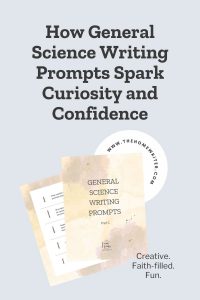How General Science Writing Prompts Spark Curiosity and Confidence
I love nature walks. When my children were young and we traveled with my husband for his work, I only had two goals for our school week: 1. We would accomplish math daily, and 2. We would take plenty of nature walks, observing plants and animals, rocks and water.
Memories of these younger years are what inspired me to write these general science writing prompts.
What is General Science?
General science introduces students to the fundamental principles of multiple scientific disciplines, including biology, chemistry, physics, earth science, and environmental studies. It provides a broad understanding of how the world works, helping students make connections across different areas of study.
And, as we study science, we can’t help but see the fingerprints of God in every detail of creation—from the structure of a leaf to the laws that hold the universe together.
Why Use General Science Writing Prompts?
Combining science with writing is a versatile tool for engaging students, reinforcing what they’re learning, and strengthening their communication and analytical skills. When we use general science writing prompts, we invite our children to slow down, observe, and describe what they see. This combination encourages curiosity, critical thinking, and reflection—skills that help students develop a lifelong love of discovery.
General science writing prompts help:
- Develop critical thinking and problem-solving skills
- Encourage curiosity and careful observation
- Build confidence in expressing scientific ideas
- Foster connections between faith, creativity, and learning
When students write about what they discover, they learn to think like scientists—asking questions, exploring possibilities, and noticing God’s order in the world around them.
5 Example General Science Writing Prompts
Here are five prompts to spark curiosity and exploration in general science:
- Describe a scientific discovery that fascinates you and explain why.
- Imagine designing a simple experiment to test a hypothesis. What would you observe and measure?
- Write a story about a scientist exploring an unknown environment. What do they discover?
- Describe an everyday phenomenon (like weather, plant growth, or motion) and explain the science behind it.
- Imagine creating a new invention or solution based on scientific principles. How would it work?
You can use these general science writing prompts as part of a science lesson, a journaling exercise, or a creative writing challenge. Each one invites students to think deeply about the world God made.
Adapting Prompts for Younger and Older Students
Younger students: Focus on observation, simple experiments, and description. They might draw pictures of plants, animals, or weather events; write short sentences about what they observe; or record findings from hands-on experiments. General science writing prompts make science approachable and fun even for early elementary learners!
Older students: Encourage research, analysis, and creative problem-solving. They could write detailed reports, design experiments, or explore how different branches of science connect. Storytelling is especially powerful—students can imagine scientists, discoveries, or inventions that reflect real scientific principles.
With all ages, no special materials are needed—just curiosity, a notebook, and a willingness to observe God’s world closely.
Tips for Using General Science Writing Prompts in Your Homeschool
You don’t need a fancy lab or complicated setup to use general science writing prompts effectively. Here’s how to make the most of them:
- Set aside time each day, or once a week. Create a routine. Use a different prompt daily, or choose one each week. You can even choose one prompt for the week and build on it each day during writing time.
- Encourage observation. Take a nature walk, watch the weather, or look closely at how something works in your home. Ask questions that engage all five senses.
- Respond creatively. Let students write, draw, or record their thoughts in a journal. Encourage your child to write freely during this time. The goal isn’t a “perfect” answer—it’s to nurture curiosity and confidence as they explore God’s creation.
- Discuss together. Sharing ideas aloud helps deepen understanding and build communication skills.
This style of exploration and reflection helps students see science as a living, breathing part of everyday life.
Sign Up for More General Science Prompts
Want to keep your homeschool science fresh and engaging?
You can sign up for free daily prompts, delivered straight to your inbox to keep your students thinking critically and creatively. (Have you already gone through part 1? Get part 2 here!)
Prefer to have them all at once? The full set of 20 general science writing prompts is available for purchase as a downloadable PDF—perfect for building a science journal or adding structure to your week. (Do you already have part 1? Get part 2 here!)
Both options make learning interactive, practical, and fun while encouraging your children to explore God’s amazing world.
Final Thoughts
General science introduces students to the wonders of the natural world and builds a strong foundation for deeper study. When you combine this with writing, learning becomes personal and purposeful.
By using general science writing prompts, homeschool parents can nurture curiosity, communication, and faith—all at once. Every observation, every reflection, becomes a way to marvel at God’s creativity and grow in understanding of His world.
Start exploring general science today, and watch curiosity, discovery, and creativity thrive in your homeschool!
Just Starting?
If you are new to homeschooling and need a little extra support for this adventure, you’ll love being on my email list. Sign up below for a weekly dose of encouragement along with a writing prompt you can use with your child(ren). Let’s raise writers and shape hearts—together!








